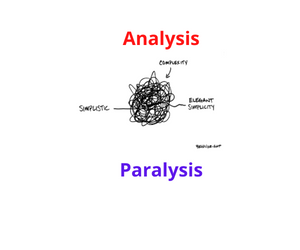Trying to wrap up change efforts with the word “digital” will not help you make a silk purse out of a pig’s ear of a process.
In some recent client work, I had the pleasure of working with two whip smart young men who showed some real talent at investigating data and identifying issues. As they built up their enthusiasm for fixing the data, they were positively salivating about what they thought they could do with some “machine learning”.
I challenged them and said that I could add more value with common sense and good old-fashioned reconciliation work, long before they could add the first Euro of value with machine learning.
Now, I may very well be wrong and for sure those two young guys will get smarter and do great things, but here is a plea to focus on the “Basics”. Getting those right does not need any of the latest buzzwords: “Digital”, “FinTech”, “WealthTec”, “APIs” and “Startups”, even if they all conjure up very glamorous world.
A real life example
From a past chapter in my career, my wife & I have some parts of our banking relationship with Credit Suisse.
Since I left CS in 2009, our account has been managed out of our local village. 80% of all interaction has been by E-mail, 15% by phone and I have met the local manager once in 8 years and been into the branch to use a teller maybe three times. Swiss banks are really pedantic, so of course there is a form to sign to allow E-mail correspondence.
For our kids, we have investment accounts, which we have used to save up some money to give them when they grow-up. Well, the elder one is nearly 19 and en route to university and the younger one is nearly 17 and will graduate high school in a year.
Enough already, my wife & I thought a couple of weeks back. There is enough money in those accounts, let’s stop adding to it. Not an urgent problem to address, or one that needs any advice, so on a Monday morning, I dashed off an E-mail to my branch manager, asking him to stop the investment part. On that E-mail was my signature, with one phone number; my mobile.
I travel a lot and my branch manager is aware of that. I heard nothing back for the rest of the week, but was not overly concerned. Back home from travelling, on the Satrurday I found a letter from CS on this topic. Yes, a letter, one of those old fashioned things we print, sign and put in the post.
The letter, duly signed by two CS officers, as per protocol, told me that Ms. Anita Somebodyorother had tried to call me by phone and failed to reach me. Please would I call her. No E-mail detail, just a number.
I was pretty sure I had not missed a call to my mobile, so I checked our home phone. There was indeed a missed call from an “uknown number”, during the working day. Banks in Switzerland suppress called ID as a matter of course.
As I was off travelling again that evening, I sent another E-mail. I told my branch manager the contact attempt was lame and asked, since it was a simple instruction, that they follow-up by E-mail as I am travelling. Four business days later I have not heard from CS.
Lessons to be Learned:
And there are a few:
From a customer’s perspective:
Channels:
Don’t change on me from E-mail to letter. CS, even if by some magical process, you think I don’t have an E-mail waiver on file, you could simply reply and ask me to contact you or call my mobile.
Speed
It all took too long.
Staff
How silly is the bank I get my service from. I send them an Email, with a phone number and they are then are silly enough not to simply reply and then doubly silly to call my home number in the middle of the day, then be surprised I am not home and then send me a letter.
From a shareholder’s perspective:
Process
There are no circumstances in which you must by law have two signatories to send a client a letter asking for a call back. You are not committing the bank. If CS is dumb enough to still be doing something this unnecessary, how much other Big Place BS are you producing? As a shareholder the only thing I have seen lately is a stock price that has been heading south
My view on this:
- There are plenty of poor processes in banks that would benefit from a common sense re-think
- No “digital transformation programme” on its own will solve for all these poor processes; if you as a bank are dumb enough to have them now, then the next fashionable trend will not really help you
- People doing their jobs need to ask: What am I doing, how am I doing it and why am I doing it?
About the Author: I help banks master their post trade processing; optimising, re-engineering, building.
I understand the front-to-back and end-to-end impact of what banks do. That allows me to build the best processes for my clients; ones that deliver on the three key dimensions of Operations: control, capacity and cost.
Previous Posts
Are available on the 3C Advisory website, click here.
Publications
The Bankers’ Plumber’s Handbook
Control in banks. How to do operations properly.
For some in the FS world, it is too late. For most, understanding how to make things work properly is a good investment of their time.
My book tries to make it easy for you and includes a collection of real life, true stories from nearly 30 years of adventures in banking around the world. True tales of Goldman Sachs and collecting money from the mob, losing $2m of the partners’ money and still keeping my job and keeping an eye on traders with evil intentions.
So you might like the tool kit, you might like the stories or you might only like the glossary, which one of my friends kindly said was worth the price of the book on its own. Or, you might like all of it.
Go ahead, get your copy!
Hard Copy via Create Space: Click here
Kindle version and hard copy via Amazon: Click here
Cash & Liquidity Management
An up to date view of the latest issues and how BCBS guidance that comes into force from Jan 1 2015 will affect this area of banking. Kindle and hard copy.
Hard Copy via Create Space: Click here
Amazon UK: Click here
Amazon US: Click Here
Share on:




